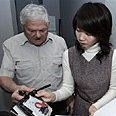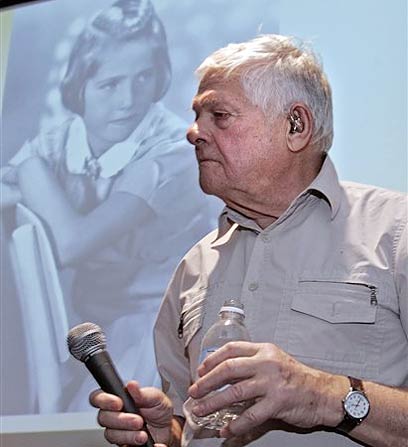
'Hana's Suitcase' has American premiere
The story of a suitcase of young Holocaust victim, Japanese researcher and victim's brother
Brady couldn't shake the guilt over the ensuing 60 years.
"Somehow I had come to terms with our parents' death, but I felt responsible for Hana," he said while visiting St. Louis where the play, "Hana's Suitcase," is having its American premiere. "It was difficult to cope with that. It still bothered me. I had wanted to bring her home."

George Brady talking about Hana (Photo: AP)
If not home, Brady brought Hana closer to heart - and got some healing for himself - in the journey documented in "Hana's Suitcase," playwright Emil Sher's adaptation of the best-selling book of the same name by Karen Levine.
Looking for Hana
George and Hana Brady's story unfolds in "Hana's Suitcase" to a group of contemporary Japanese school children, who learn about the girl who had to abandon her bag before being marched to the gas chamber.
The suitcase, marked with Hana Brady's name, birth date and "Waisenkind," German for "orphan," arrived in 1999 at the Tokyo Holocaust Education Resource Center, a tiny storefront operation, for a children's exhibit.
The kids became curious, wanting to know who Hana was, what she put in her suitcase and what happened to her parents. Fumiko Ishioka, then a staffer and now the Holocaust center's director, embarked on a quest across two continents to uncover Hana's story.
"It was just a simple suitcase, but it showed the story of six million Jews being killed," Ishioka said. "I wanted to give it a face. I saw it as a symbol of life. It illustrated not only what happened to this one little girl, but what life she had before, what family she had."
The book and the play alternate between George and Hana's world in the 1930s and 1940s, and that of Ishioka and the Japanese children's search for Hana's identity, 60 years later.
"They are separated by time, by culture, by geography," Sher said. "Yet (Ishioka) worked so relentlessly to bridge it."
Ishioka learned that Hana had come to Auschwitz from Theresienstadt, a walled, guarded prison town for Jews in Czechoslovakia whose adult inmates ran a secret art school for the children. She later uncovered five drawings by Hana at the Jewish Museum in Prague.
She traveled to the camp's museum, where she found Hana's name on a list of tens of thousands of Jewish detainees. Above Hana's name was that of George, and a mark indicating he had survived. Ishioka then went to the Jewish Museum in Prague, which tracked down George Brady's labor camp bunkmate. He provided Brady's current address in Toronto.
Ishioka recalled that when she wrote George Brady in 2000, she wasn't sure how he would accept a stranger's query about his beloved little sister.
"I was quite nervous," she said. "I wasn't sure he would write back."
Fulfilling her dream
Brady, now 79, said when he received the "big fat envelope from Japan" that held Ishioka's letter and drawings from Japanese school children, he called his wife and daughter over. "I said, 'Look what's going on,'" he recalled. "It made me feel good. It was definitely healing."
Since Brady and Ishioka met in January 2001, they have told their story throughout the United States, Canada and Israel. Next month, they'll be in Mexico.
The story first appeared in a Jewish newspaper in Canada, then it aired on the CBC. It later was told in the book, which has been translated into 35 languages. The play followed. A Canadian documentary is in the works.
Brady said his younger sister had dreamed of becoming a teacher, and in a real way, she accomplished that.
"She's teaching kids all over the world respect for each other, tolerance," he said. "Out of the tragedy comes something very positive."










